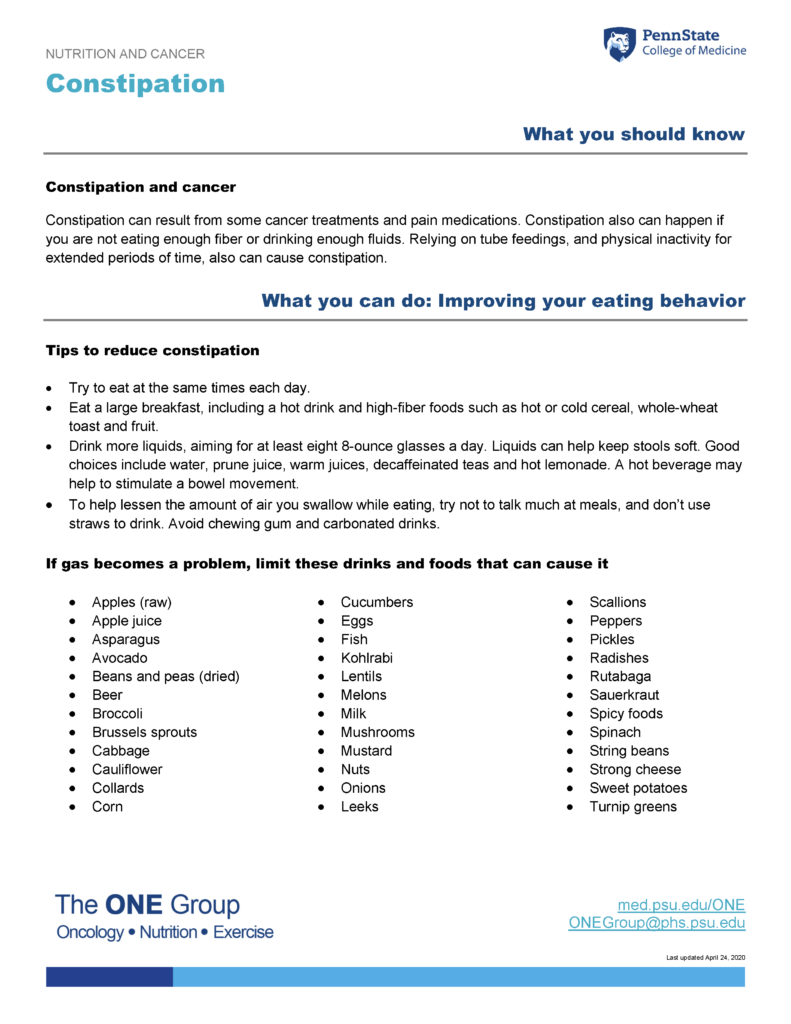Learn about constipation in people with cancer in this guide from The ONE Group (Oncology – Nutrition – Exercise) at Penn State College of Medicine.
Jump to topic
Search
What you should know
Constipation and cancer
Constipation can result from some cancer treatments and pain medications.
Constipation also can happen if you are not eating enough fiber or drinking enough fluids.
Relying on tube feedings, and physical inactivity for extended periods of time, also can cause constipation.
What you can do: Improving your eating behavior
Tips to reduce constipation
- Try to eat at the same times each day.
- Eat a large breakfast, including a hot drink and high-fiber foods such as hot or cold cereal, whole-wheat toast and fruit.
- Drink more liquids, aiming for at least eight 8-ounce glasses a day. Liquids can help keep stools soft. Good choices include water, prune juice, warm juices, decaffeinated teas and hot lemonade. A hot beverage may help to stimulate a bowel movement.
- To help lessen the amount of air you swallow while eating, try not to talk much at meals, and don’t use straws to drink. Avoid chewing gum and carbonated drinks.
If gas becomes a problem, limit these drinks and foods that can cause it
- Apples (raw)
- Apple juice
- Asparagus
- Avocado
- Beans and peas (dried)
- Beer
- Broccoli
- Brussels sprouts
- Cabbage
- Cauliflower
- Collards
- Corn
- Cucumbers
- Eggs
- Fish
- Kohlrabi
- Lentils
- Melons
- Milk
- Mushrooms
- Mustard
- Nuts
- Onions
- Leeks
- Scallions
- Peppers
- Pickles
- Radishes
- Rutabaga
- Sauerkraut
- Spicy foods
- Spinach
- String beans
- Strong cheese
- Sweet potatoes
- Turnip greens
Gas also might be caused by
- Chewing gum
- Not taking in enough fluids
- Carbonated or fizzy drinks
- Not exercising
- Chewing with your mouth open
- Eating a lot of high-fiber foods
- Eating foods and candies, chewing gum and/or drinks with sugar alcohols, such as maltitol, mannitol and xylitol (these products are often labeled “sugar free” or “no sugar added”)
Foods to try
High-fiber vegetables like broccoli, corn, beans, cabbage, cauliflower and peas and whole-grain breads.
Recipes
Green Smoothie
Ingredients:
2 cups raw spinach
1 cup prune juice
1 cup chopped cucumber
Instructions:
Blend all ingredients together.
Berry Spinach Smoothie
Ingredients:
2 cups raspberries, strawberries or blackberries (fresh or frozen)
3 cups spinach
1 cup Greek yogurt
1 banana (fresh or frozen)
1 cup apple juice
1 handful of ice
Instructions:
Put berries and spinach in the blender first, then the rest of the ingredients, and blend.
Other practical tips
Consider a fiber supplement or over-the-counter medications such as stool softeners or laxatives if necessary. Always speak with your health practitioner first for specific guidance. Also remember to drink plenty of fluids with such fiber supplements.
Exercise and physical activity
Increase your physical activity, aiming for a walk or other limited exercise every day.
Where can I find more information about aerobic and strength-training exercises?
If you are interested in starting aerobic and/or strength-training exercises, The ONE Group (Oncology – Nutrition – Exercise) provides videos demonstrating proper form for more than 50 exercises.
Notes
References
- Academy of Nutrition and Dietetics
- American Cancer Society
- American Institute for Cancer Research
- National Cancer Institute

